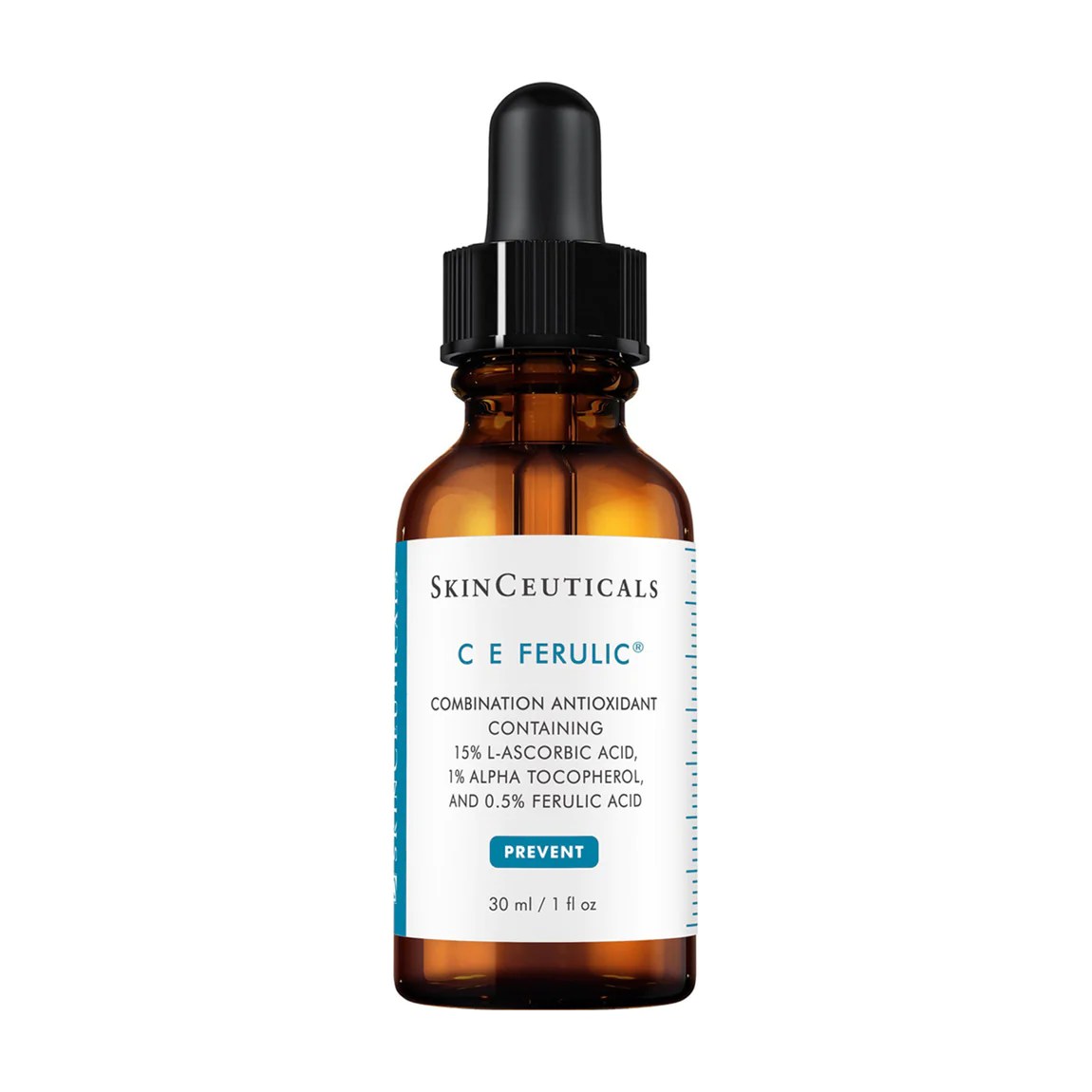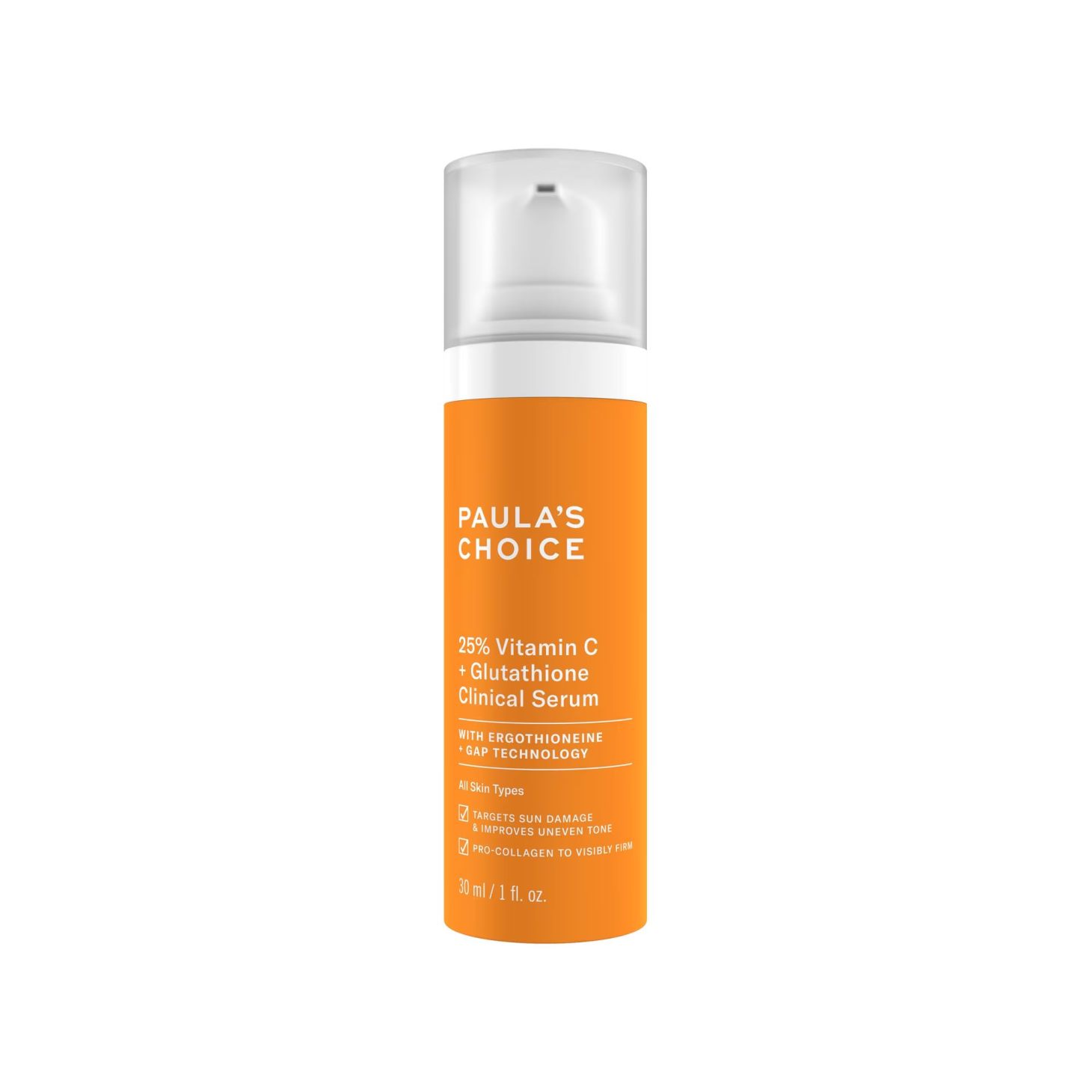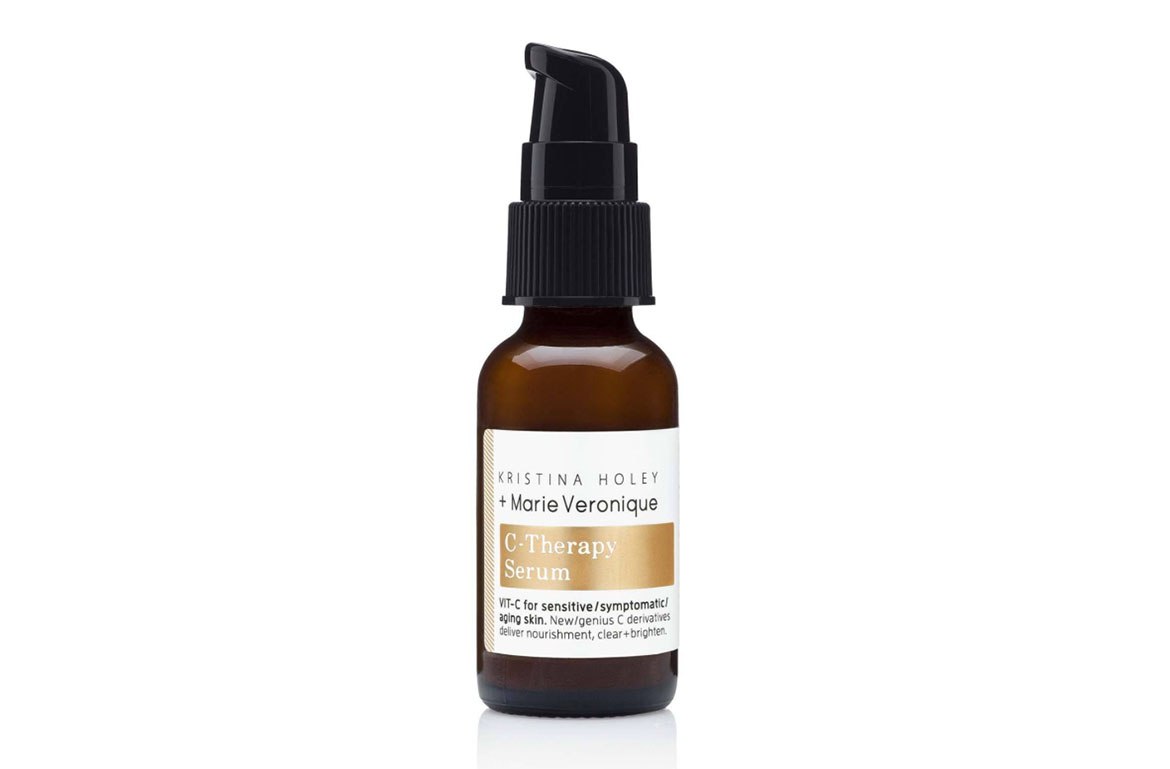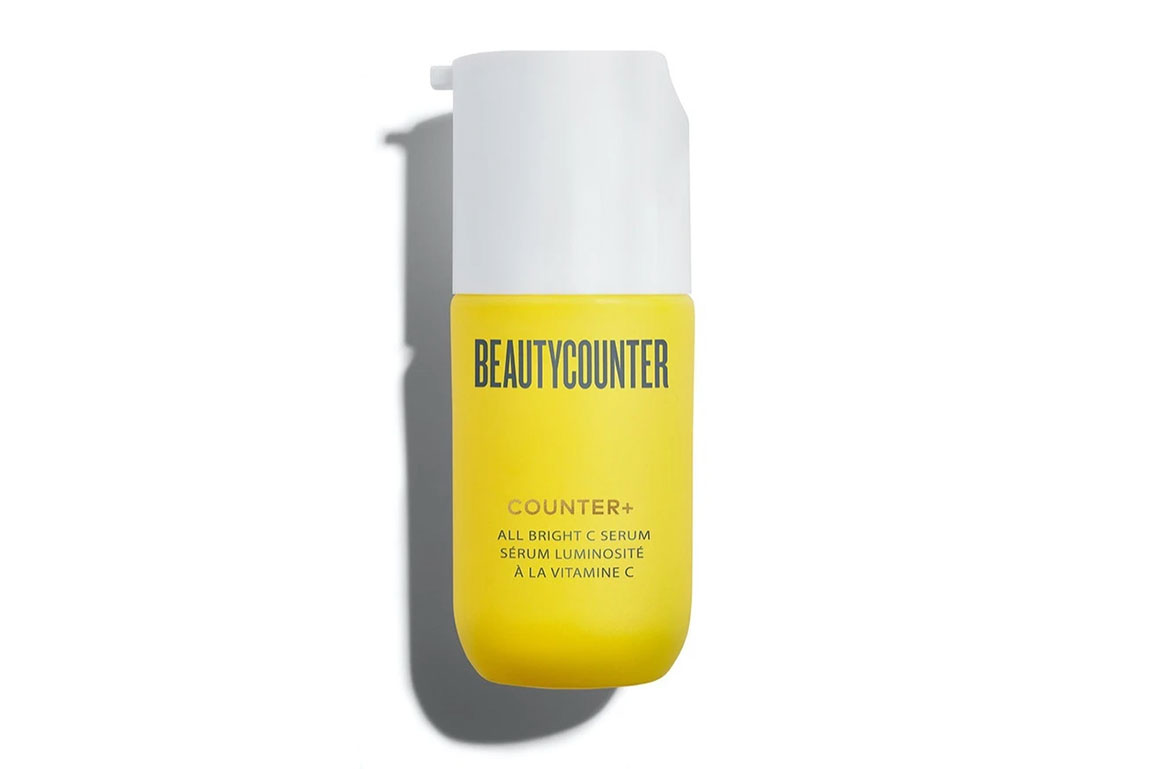Vitamin C Is a Skin-Care Superstar, but If It’s Irritating Your Complexion, There’s an Easy Fix
"We don't make vitamin C; it's just us and the fruit bat that don't make our own vitamin C—we're the outliers," explains chemist and skin-care expert Marie Veronique, who has a highly coveted eponymous skin-care line. "But we do know that vitamin C is very important for the skin." That's why there's been an influx of vitamin C serums, moisturizers, and cleansers onto beauty shelves.
"With this obvious rise of vitamin C products on the market, there was a direct correlation to these [irritation] responses to vitamin C," says Holey. This led the skin-care duo to investigate what was up—and share their findings with us.
Ahead, read about how vitamin C can lead to irritation, what an allergic reaction to vitamin C looks like, the common side effects of vitamin C, and the vitamin C serums that top dermatologists recommend.
- Brooke Jeffy, MD, board-certified dermatologist and founder of BTWN, a skin-care line specifically formulated for children, tweens, and teens
- Geeta Yadav, MD, board-certified dermatologist and founder of FACET Dermatology
- Joshua Zeichner, MD, director of cosmetic and clinical research in dermatology and associate professor of dermatology at Mount Sinai Hospital
- Kristina Holey, holistic skin specialist
- Marie Veronique Nadeau, chemist, skin-care expert, and founder of Marie Veronique
Why does vitamin C irritation occur?
At a basic chemistry level, your skin's acid mantle3 sits at a pH of around 4.5 to a 5. And vitamin C is a potent acid, notes Veronique, so in order for it to best penetrate your skin, "it has to be at a pH level of about three (or more acidic)," she says.
It sounds like a scary experiment to be slathering acids on skin, but actually, most active ingredients are formulated at a low pH, says Joshua Zeichner, MD, a board-certified dermatologist. Ingredients such as L-ascorbic acid, retinoic acid, and hyaluronic acid all carry a low pH. "This may cause some skin irritation," according to Dr. Zeichner.
{{post.sponsorText}}
Skin irritation can be caused by expired vitamin C serum, too. Aside from the naturally acidic makeup of vitamin C, when oxidation—the process by which vitamin C interacts with air, which then renders it useless—happens, sensitization and irritation can often follow. While this usually occurs in old formulas packaged in a bottle, vitamin C can also oxidize on your skin when it comes into contact with oxygen. This creates hydronium ions, according to Veronique, which can lead to skin sensitivity.
"You can only put acids on your skin so many times before you see something happens... and vitamin C is a strong acid," Veronique explains.
"It's tricky when you really mess with your skin's pH levels repeatedly," says Veronique. "A lot of the barrier function compromises come from not paying attention to the pH balance and the microbiome. You can only put acids on your skin so many times before you see something happens, and vitamin C is a strong acid." That's why Holey and Veronique concocted their new C-Therapy Serum ($115), which uses new, more stable and gentle vitamin C derivatives for symptomatic skin.
"Some of the newer vitamin C esters are more stable than pure ascorbic acid and can be formulated with a higher pH with less potential skin irritation," says Dr. Zeichner. Not to suggest that L ascorbic acid—aka a form of vitamin C—is bad for your skin, however: You've just got to stick with the right formulations (avoid going overboard with using it).
Holey recommends being especially careful with how frequently you’re applying vitamin C. Depending on your skin’s health and sensitivity, applying a high percentage of vitamin C to your skin more than once a day can push your skin past its limits. Watch out for inflammatory responses like pustules, dermatitis, extra redness, or breakouts when using vitamin C, and stick with these more gentle formulations if you experience the common symptoms that accompany overuse.
While rare, skin irritation can also be caused by an allergic reaction to vitamin C. Itchy hives, rashes, and eczema can all be signs of an allergic reaction to vitamin C.
What does vitamin C irritation look like?
While it varies from person to person and can range in severity from mild to severe, there are few tell-tale irritating vitamin C side effects.
Common vitamin C side effects include:
- Itching
- Burning
- Red skin
- Hives
- Inflammation
- Sensitivity
Whatever your symptoms are or whatever the source of the vitamin C irritation may be, you can switch to a vitamin C alternative like niacinamide if the ingredient just doesn’t mesh well with your skin.
Things to avoid while using vitamin C
While you can use vitamin C daily, dermatologists do warn against mixing it with certain ingredients.
“Don't mix benzoyl peroxide with vitamin C—they'll cancel each other out and make both ingredients ineffective,” explains Dr. Geeta Yadav, MD, board-certified dermatologist and founder of FACET Dermatology. “I'd also avoid pairing vitamin C with AHAs, BHAs, and retinoids as these ingredients can all be sensitizing individually, and combining them could really irritate the skin.”
What to look for in a vitamin C serum
When shopping for a vitamin C serum, there are a few features you should consider that will improve the efficacy of the product, according to dermatologists. Below are four of the most important things you should look for while shopping for a vitamin C serum.
4 things to consider before buying vitamin C products:
1. The form of vitamin C
Not all forms of vitamin C are created equal.
“The form of vitamin C matters,” says Brooke Jeffy, MD, board-certified dermatologist and founder of BTWN, a skin-care line for kids, tweens and teens. “Ideally, you want a product that contains pure vitamin C listed as ascorbic acid or l-ascorbic acid.”
2. The percentage of vitamin C
When shopping for facial vitamin C serums, “you'll want to look at percentages,” says Dr. Yadav. “I recommend a percentage of at least 10% to get the maximum benefit from vitamin C.”
When it comes to products that cover more sensitive areas of your face, like vitamin C eye creams, opt for smaller percentages of vitamin C, or look for products that contain tetrahexyldecyl ascorbate (THD), ascorbic acid’s gentler counterpart.
“Ascorbic acid is the purest and most potent form, but it's also the most unstable,” adds Dr. Yadav. “Other forms, like THD, are still effective and are more stable, and in many cases, may not be as sensitizing as ascorbic acid.”
3. Opaque packaging
Stick to vitamin C serums that come in dark, opaque bottles, tubs, and jars. Light exposure hinders the positive vitamin C side effects.
“To remain stable, the product should be in opaque packaging to protect from light and also limit oxygen exposure,” says Dr. Jeffy.
4. Other ingredients used
“You'll also want to consider the other ingredients used—combining vitamin C with other antioxidants can make it more stable and effective,” says Yadav.
Dr. Jeffy recommends reaching for water-based serums, which are absorbed more quickly than oil-based serums.
Consider, too, your other skin-care goals. Some products like the Olay Vitamin C+ Peptide 24 Moisturizer contain skin-boosting ingredients that can further plump, smooth, and brighten skin.
Need some vitamin C serum recommendations? Here are a few derm-beloved favorites.

Skin type: Normal, dry, combination, and sensitive
Ingredients: 15% L-ascorbic acid vitamin C, vitamin E, ferulic acid
Benefits: Brightens complexion, evens out discoloration, lightly hydrates
Both Dr. Yadav *and* Dr. Jeffy love the C E Ferulic serum from SkinCeuticals. This potent serum neutralizes free radicals and protects your skin from oxidative stress while evening out uneven skin.
“This is my favorite vitamin C because it’s potent and combines the ingredient with ferulic acid and vitamin E,” says Dr. Yadav. “Studies show that this combination is very effective at protecting against aging.”
Pros:
- Contains vitamin E and ferulic acid to boost the benefits of vitamin C
- Good for sensitive skin
- Protects skin against free radicals
Cons:
- Premium price point

Skin type: Normal, dry, combination, and oily
Ingredients: 25% vitamin C, glutathione, amino acids, ergothioneine
Benefits: Brightens dull skin, evens out discoloration, lightly hydrates
This potent 25 percent vitamin C serum from Paula’s Choice is one of Dr. Yadav’s favorite serums to recommend to his patients.
“I like this formula because it uses gentler forms of vitamin C as well as glutathione, a powerful antioxidant that also helps reduce sensitivity and increases the stability of vitamin C,” says Dr. Yadav. “It also has a unique texture—most vitamin C serums are watery, while this one is creamy, making it a nice pick for those with dry skin.”
Pros:
- Contains 25% vitamin C that targets stubborn discoloration and sun damage
- Boosts skin’s antioxidant supply
- Glutathione + GAP technology (glutathione amino acid precursors) minimizes irritation
Cons:
- Can be too powerful for some sensitive skin types

Skin type: All skin types (especially sensitive skin)
Ingredients: Green tea leaf, 4 types of vitamin C, glutathione, grapeseed oil,
Benefits: Stimulates collagen production, brightens skin without irritation, stronger skin barrier
Veronique and Holey formulated this serum specifically for sensitive and breakout-prone skin types. It uses two stable derivatives of vitamin C—tetrahexyldecyl ascorbate and magnesium ascorbyl phosphate—so that you get the same brightening and antioxidant effects of vitamin C minus any irritation, plus it has glutathione for healthier overall skin barrier function.
Pros:
- Formulated for sensitive skin
- Safe for all skin types
- Contains four derivatives of vitamin C and supportive antioxidants
Cons:
- Premium price point

Skin type: All skin types
Ingredients: 10% vitamin C blend, turmeric, camu camu extract
Benefits: Brightens skin, evens skin tone, boosts natural glow
This gentle, soothing serum absorbs quickly for brighter, more even skin—it uses vitamin C and its derivative tetrahexyldecyl ascorbate along with antioxidants like turmeric and camu camu for moisture and a nourished complexion.
Pros:
- Turmeric and camu camu help brighten skin even more
- Absorbs quickly
- 10% blend of vitamin C
Cons:
- Vitamin C percentage could be too strong for certain skin types
How often should you apply vitamin C?
It might seem dangerous to apply vitamin C every day (it is an acid, after all!), but dermatologists recommend it if you want to reap all of its skin-brightening, line-smoothing benefits it can provide.
Dr. Yadav recommends using it every morning in conjunction with sunscreen before starting your day. “Vitamin C offers a lot of benefits, including free radical defense and photoprotection, and wearing it daily can protect you from the ravages of daily life,” says Dr. Yadav. Pairing up vitamin C with SPF can help protect your skin against harmful UV rays and oxidative stress.
Dr. Jeffy shares that if you’re looking for extra protection or are focused on improving an uneven skin tone, apply it twice a day.
“It depends on your goals,” explains Dr. Jeffy. “If primarily [using it] as an antioxidant boost to your sunscreen, then use it in the morning. If [you’re] looking to improve the consequences of photoaging, then use it twice a day.”
Vitamin C side effects FAQs:
Is it OK to use vitamin C serum every day?
Yes!
According to both Dr. Yadav and Dr. Jeffy, as long as you don’t experience any adverse reactions or vitamin C irritation, daily use of vitamin C is totally fine. Of course, follow the application directions found on your vitamin C serum’s bottle, as most formulations require you to apply it to dry skin.
“Vitamin C can be irritating to the skin, especially at higher strengths,” explains Dr. Jeffy, “but if [you’re] tolerating [it] well, there is no need to stop, and it can be used continuously.”
“It's one of the most effective ingredients in the skin-care arsenal,” adds Dr. Yadav. “I recommend it to all of my patients.”
When should you not use vitamin C serum?
If you start noticing negative vitamin C side effects like skin redness, burning, or hives, stop using it immediately. This irritation could be caused by an allergic reaction to vitamin C, expired or unstable ingredients, or sensitive skin.
“Avoid the use of AHAs and BHAs with vitamin C to reduce the potential for irritation, but also to avoid reducing the potency of your vitamin C product,” adds Dr. Jeffy.
Can vitamin C serum cause skin irritation? What does vitamin C irritation look like?
Unfortunately, yes, vitamin C serum can cause skin irritation to occur, especially in those with sensitive skin or a vitamin C allergy.
Symptoms of vitamin C irritation include redness, mild to severe burning, and stinging. Hives, pustules, and inflammation can also occur.
When should I stop using vitamin C serum?
If you experience persistent stinging, itching, or burning sensations, dermatologists recommend halting the use of vitamin C immediately.
“If your skin is highly irritated, stop using it,” says Dr. Yadav. “Ascorbic acid is highly acidic, and it can throw off your skin's natural pH, especially if you have sensitive skin. Those skin types should not use a vitamin C that exceeds 10%. You can also try different forms of the ingredient, which are gentler on skin.”
Curious about the benefits of vitamin C? You can learn more about vitamin C in our episode of Dear Derm, below:
- Pullar, Juliet M et al. “The Roles of Vitamin C in Skin Health.” Nutrients vol. 9,8 866. 12 Aug. 2017, doi:10.3390/nu9080866
- Telang, Pumori Saokar. “Vitamin C in dermatology.” Indian dermatology online journal vol. 4,2 (2013): 143-6. doi:10.4103/2229-5178.110593
- Lambers, H et al. “Natural skin surface pH is on average below 5, which is beneficial for its resident flora.” International journal of cosmetic science vol. 28,5 (2006): 359-70. doi:10.1111/j.1467-2494.2006.00344.x
Loading More Posts...